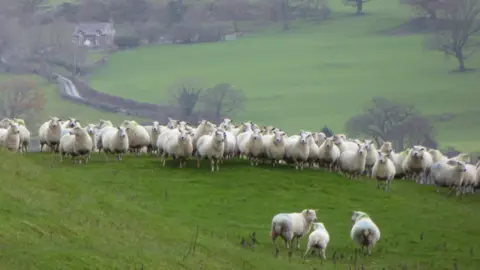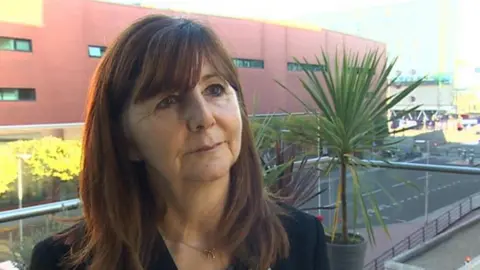Wales to target 'net zero' climate change emissions
 Getty Images
Getty ImagesWales has accepted a target to cut carbon emissions by 95% by 2050 - but wants to go further and reach "net zero", the Welsh Government has said.
The Committee on Climate Change (CCC) set out the recommendation in May, saying Wales could only reach a 95% reduction due to the importance of the farming industry to rural communities.
A farming union said it recognised the contribution farmers needed to make.
The UK government has announced a "net zero" target by 2050.
Lesley Griffiths AM said the Welsh Government would bring regulations to the assembly to amend its target.
Ms Griffiths, the minister for environment, energy and rural affairs, said: "I want to go further and I am declaring our ambition to bring forward a target for Wales to achieve net zero emissions no later than 2050."
In March, the Welsh Government published its low carbon plan containing detailed sector-by-sector emissions profiles and 100 policies and proposals to achieve a low-carbon Wales.
Ms Griffiths later declared a climate emergency hoping it would trigger "a wave of action".

The Welsh Government will bring regulations to the assembly next year to amend the existing 2050 target and budgets as necessary.
Ms Griffiths also urged the UK government to ensure the costs of moving to net zero are spread across the UK and called for closer collaboration across all governments.
She said: "I have requested a meeting with my UK and Scottish counterparts to discuss how we will rise to the challenge of climate change together."
John Davies, president of the National Farmers' Union, said it had already outlined that improvements in productivity, carbon capture and renewable energy production were the most effective ways to realise such ambitions.
He added that agriculture contributes 12% to Wales' overall emissions "and we absolutely recognise the contribution we have to make in tackling climate change".
"Our organisations are aligned: acting to tackle damaging climate change is vital."

Analysis by BBC Wales environment correspondent Steffan Messenger
The actual target the Welsh Government will put in law is for a 95% cut in emissions, but they say their ambition is to go even further.
It has been described as "brilliant news" by the Committee on Climate Change, which advises them.
But in its latest report, the committee warned that reaching a net-zero goal would be more challenging for Wales than the rest of the UK.
It is partly because there is less space here to plant vast forests of trees to soak up carbon dioxide than in Scotland.
But it is also because sheep and cattle farming is so important to rural parts of the country. To put it politely, reducing the methane emitted from either end of their digestive systems is difficult.
The farming industry says it is up for the challenge though, with NFU Cymru suggesting the sector could achieve net-zero emissions by 2040.
Changes to the subsidy scheme for farmers after Brexit will put more emphasis on paying them to help fight climate change too.
Another hurdle is that Wales' emissions from burning fossil fuels look high, but that's because a lot of the electricity is exported to England.
For instance, Wales accounts for 6% of the UK's electricity needs, but hosts 19% of its natural gas power stations.
The power to change that is largely down to the UK government, which is why Welsh environment minister Lesley Griffiths has said a more "collaborative approach" is needed if both the UK's and Wales' targets are to be met.
